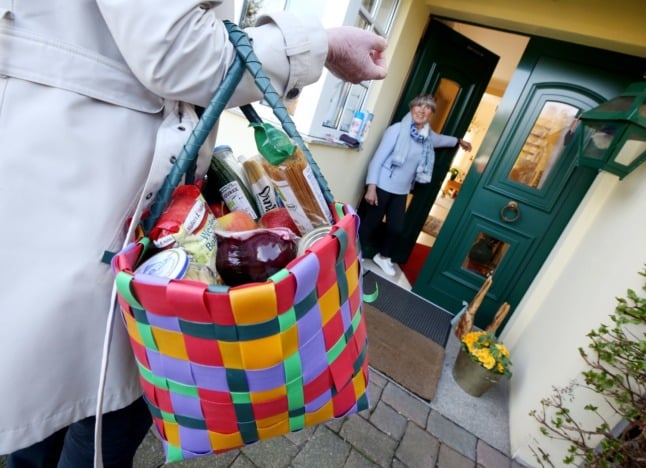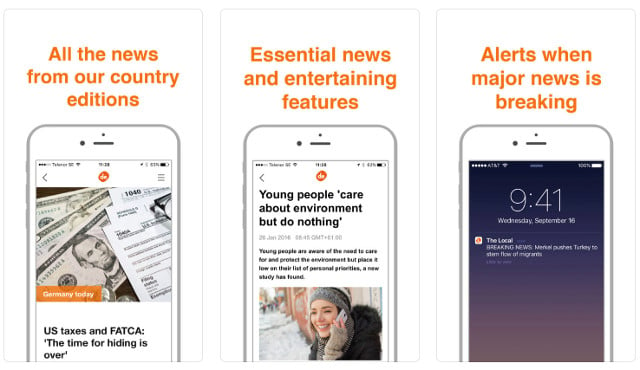One of the most important things you can do if you’re moving to Germany is try to use the language. Although a lot of Germans speak English and other languages, it’s always more polite to at least make an effort in their language, even if you don’t think you’ll ever make it to fluency.
Tandem is a great language exchange app which connects language learners with native speakers to get conversation practice. It’s by a German company which was founded in Hannover and is now located in Berlin, and it supports 300 languages. So once you’ve mastered German you can move onto another one sharpish.
Tandem will help you to gain a good grounding in the language in a controlled environment, and to work on using your conversational skills. You also might make friends in the process.
READ ALSO: Five beginner German language mistakes to avoid
This social networking app allows people to link up with and get to know their neighbours, aiming to strengthen neighbourhood communities and provide opportunities to support and be supported by those around you.
On the app, you input your address (with proof of residence) and are placed in contact with others in your neighbourhood to share local tips and recommendations, offer help and support, swap and exchange goods or organise in-person social events.
The site has a large customer base, which means that even though you might have more luck finding your neighbours on it in a big city, there are plenty of people in smaller towns who are also registered.
This app is a godsend in pandemic times, when people might feel less comfortable with you going straight to knocking on their door or inviting them round to tea, and allows you to communicate your boundaries as well as building up a strong community around you.
Germans are known for being private and more difficult to make friends with – at least when you first meet them – so this could also help break down barriers.
READ ALSO: Studying in Germany: These are the words you need to know

If you want to follow The Local’s list of tips to embrace German culture, you’ll surely be wanting to get out cycling or hiking as soon as you land. Komoot is one of the best apps for finding and planning routes around Germany.
Using an algorithm based on ability, location, bike type and time available, you can use Komoot to plan your route around the optimum conditions for your cycle ride or walk. Komoot will tell you the distance, elevation profile, road surface, fitness level required, difficulty and an estimated duration of your journey.
It is also easy to use during your journey, even without an internet connection, to stay on track and keep on top of your location. Finally, it allows you to connect with other enthusiastic nature lovers to exchange tips, routes, stop-off points and more.
READ ALSO: Five German foods to try this summer
Anyone who has stayed in Germany for any length of time while using public transport will wax lyrical about this app. It compiles information about the routes and timings of almost any train running in Germany, regardless of whether it’s for your daily commute, family holiday, or reclusive day trip into nature.
You can explore routes, buy tickets, check into your seat, access journey details and even check how full your train will be before travelling on the app. Its price finding function is particularly appealing, helping you to find the most affordable options for your journey.
You’ll also be made aware when there’s disruption such as strikes or weather-related incidents.
You might be used to scouring The Local Germany every morning for your daily hit of German language and culture, or receiving our newsletter. But what about getting alerts straight to your phone when we produce new content? Sounds pretty good, right?
Well, luckily for you, The Local has a free smartphone app which you can use to access content from all nine countries we cover so that you can keep up to date on both Germany and wider Europe. It’s available on Apple and Android phones, and will be an indispensable guide to living the German lifestyle.

6. German news apps
You should also think about downloading some of the major German news apps if you’re going to be staying in Germany for any length of time to expand your language skills. Whichever you choose to download will be up to your taste and what difficulty level you’re looking for in the language, but popular choices are Der Spiegel, Zeit Online, or Tagesschau. Many German language learners enjoy Tagesschau for its ‘100 Sekunden’ (100 seconds) videos, which condense the day’s news into a short video only 100 seconds in length. In fact.
Not only will these apps improve your German and provide you with interesting conversation topics to cover with your new friends, but they will also give you a great grounding in the uniqueness of German politics and culture.
Finanzguru is a German budgeting app which helps you to keep track of funds coming in and out of your accounts, as well as how sustainable your spending is.
When you’ve just moved abroad, budgeting becomes ten times harder – not only because you’re adjusting to the different currency and trying to shoulder moving and travelling costs, but also because a new country can feel like a sweet shop where you want to buy everything you see to compensate for the stress of moving. If you use Finanzguru – or a similar money tracking app – carefully to track your income and spending, you’ll feel a lot more secure and at home.
This app is useful wherever you go abroad, as it contains city guides for over 80 cities at a very small, more than reasonable price. It works as a non-traditional guidebook to the city with tips and tricks given by locals who have lived in the area for many years.
READ MORE: Eight unique words and phrases that tell us something about Germany
The app’s ‘spotters’ have insights into the city that are up-to-date, quirky and contain a lot of insider knowledge. All spotters are met and scouted in-person by the Spotted by Locals team to ensure that there won’t be any fake reviews, and when you have been in the city for a while and learned the language you can even sign up to be a spotter yourself.
You won’t find a Spotted by Locals guide for every city in Germany, but many of the major cities are covered, giving you the chance to delve deeper into the life of the place where you’ll be living.

This is the official Covid-19 contact tracing app in Germany, which notifies you if you have been in close contact with someone who has tested positive for the virus. App users share their positive test information with the app voluntarily, and then users who have been in contact with them are notified, informing them of when and how long they were in contact with the infected person.
You might be tempted to give downloading the app a miss at this stage of the pandemic, but virologists still insist on its effectiveness at preventing the spread of the virus. In addition to this, you can add your digital vaccination certificate to the app to prove your vaccination status – or the results of a Covid test – to ‘check in’ to some places like public pools, bars and restaurants.
The least you can do when moving to a new place abroad is make sure you’re doing your bit to keep the people around you safe and healthy, so try to download this app as soon as you touch down.
Lieferando is the German answer to Deliveroo, and your one-stop shop for any dinner cravings when you want to treat yourself to the best of the restaurants in your town without having to leave your living room.
You use the app to select food and drink from its vast selection of options from almost any restaurant near you, and it will be delivered straight to your front door within just one hour. You can pay using Paypal, credit card, bank transfer or cash, and Lieferando operates in the vast majority of cities and towns across Germany.
Also check out other food delivery apps such as Wolt or Gorillas.







 Please whitelist us to continue reading.
Please whitelist us to continue reading.
I love The Local. Read it every day. But promoting your native app? C’mon. You know as well as I do that your app is horrible.
As a software engineer, I take offense to apps that are as bad as yours. It’s not even an “actual” app as far as I can tell. It’s more likely non-native code that has been compiled into a “native” format and merely wraps a website.
I would recommend carving out a bit more of your budget and hiring native app developers. Or at the very least, hiring JS developer(s) that know React Native. With React Native, you can at least create a convincing “native” app.
This isn’t a diatribe against The Local. You are awesome! But take a look at 99% of the apps on your phone. Now use The Local’s app. Notice any difference?
Hi Norm, thanks for your comment. We will certainly take the feedback on board. We’re always working to improve our products. I’m sure you understand, though, that of course we want to mention our app in a story like this because we’re still proud of it! Nevertheless – we’ll always try and do better.
Hi Rachel, I can understand being proud of it. And my words were indeed harsh. I’m sure a lot of effort has gone into the app.
But the app has needed work for a long time. I hope to see it get better soon!
Thank you! We’ll definitely do our best!
NINA is also an important app to have, for emergency information from the government.